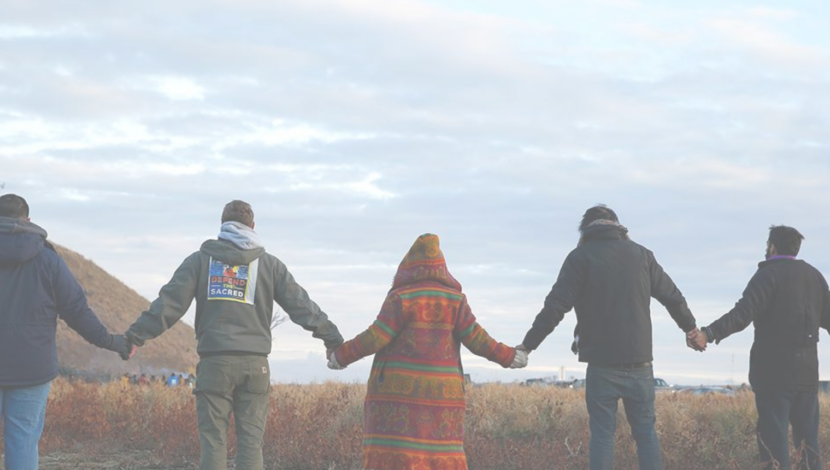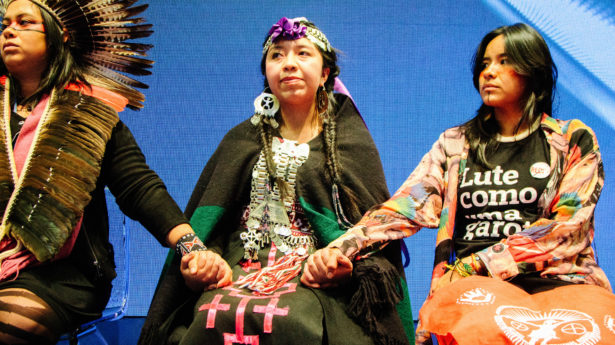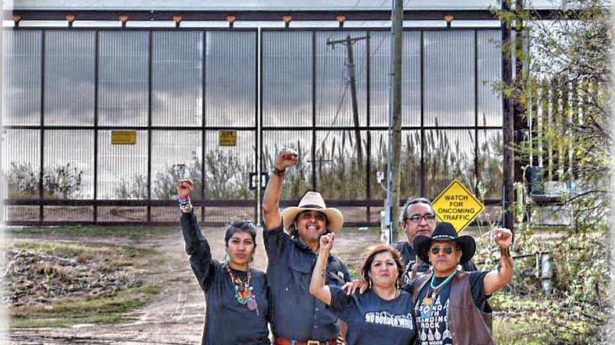The Unitarian Universalist Service Committee advances human rights through grassroots collaborations.
Day of Mourning Calls Us to Remember, Reflect, Recommit

By Mike Givens on November 23, 2022
The Thanksgiving holiday is celebrated across the United States as a commemoration of the Puritans and Pilgrims landing in what we now know as Massachusetts—the territory originally occupied by the Wampanoag, Pokanoket, and Patuxet Indigneous tribes—in the 1620s and 1630s.
These European settlers brought their Days of Fasting and Days of Thanksgiving traditions with them and history—always written by those with power—has often characterized the relations between the settlers and the Indigenous communities as amiable and collaborative.
What history often doesn’t explore is the physical and cultural genocide that came with the colonists. Diseases, guns, and imperialistic intentions contributed to the expansion of European communities and the diminishing of Native tribes. Yet this is not the end of their diverse, multicultural, and vibrant stories. While the pervasiveness of the “Manifest Destiny” belief that developed in the mid-19th Century would serve as a driving force behind the continued displacement and dispersal of Native communities, it failed to overcome the indomitable spirit of Indigenous tribes across the United States.
On this annual Day of Mourning, we remember the past, reflect on our current circumstances, and recommit ourselves to a future where Native communities are treated with the dignity, respect, and deference they deserve.
Remember
Though 400 years have passed, the oppression, dehumanization, and displacement of Native communities is still prevalent and the malignancy of colonization continues to push Indigenous peoples further away from their ancestral lands—and each other. However, the story of Indigenous communities in the United States is one of fortitude, innovation, and a profoundly sacred relationship with the earth.
This Day of Mourning demands that we remember the hazardous costs of capitalism and industrialization, which have irreparably damaged earth’s fragile ecosystems. The burning of fossil fuels, oil and gas extraction, greenhouse gasses, and a fundamental imbalance between the earth and humankind has led to a climate crisis so deadly, there is little hope that we can change its effects. Unfortunately, Indigenous peoples—in addition to the indignity of being displaced—have had to bear the brunt of the climate crisis, the earth’s retribution against humankind for its reckless treatment of the planet’s resources, and environmental racism, the conscious oppression that we human beings inflict upon each other in the name of capitalism, corporate greed, government neglect, and our reticence to treat each other with dignity and respect.
Reflect
While the current state of affairs may seem dire, we are also living in a time of great advocacy, leadership, cultural pride, and strength as we see Indigenous communities continue to assert themselves and their rights.
Here are just a few examples:
- UUSC partner the Carrizo-Comecrudo Tribe of South Texas continues its inspiring work of calling attention to the dangers of liquid natural gas (LNG) terminals in the second largest state in the nation. The Tribe’s efforts to call attention to the environmental hazards of these terminals—which are consistently built on tribal lands and near Indigenous communities—has humanized an issue demanding national attention. The Tribe has also faced the Trump and Biden administrations as they demand an end to the construction of border walls on lands the Tribe holds sacred.
- Located in northwestern Alaska, the Native Village of Kivalina is quite literally being swept away into the Arctic Ocean and Wulik River. Climate change impacts such as melting permafrost as well as rising temperatures have completely decimated the traditional lifeways of members of the Kivalina Tribe. Caribou and seal hunting, fishing, and whaling are just a few of the lifeways that are impacted by melting sea ice and unpredictable weather. The environmental racism faced by the Indigenous residents of the village—more than 90 percent of the village’s population is Native—has meant that relocation plans have often been hampered and village officials have had to seek out the help of nonprofits organizations like the Alaska Institute for Justice—a UUSC partner—for resources to continue relocation efforts. Though small, the village has never relented in its efforts to call attention to climate change and the barriers to relocation that have been erected by the state and federal governments.
- Southern Louisiana is home to a number of Indigenous communities facing the impacts of climate change. Like their counterparts in Alaska, tribe members have seen corporate extractive projects and climate change alter the ecosystem so severely that traditional lifeways such as fishing and shrimping have become unsustainable. Year after year, harsh storms ravage entire communities, causing many tribe members to relocate altogether, thus continuing the tragic diasporic history of Indigenous displacement. As tribes disperse, cultural identities and shared bonds are eroded and lost. Mistreatment by the state of Louisiana and the federal government have contributed to a virtual standstill, with tribes passionately fighting for state and federal recognition just to access resources to rebuild and sustain themselves. The racism built into the state and federal governments has made the onerous and daunting tribal recognition process time consuming, costly, demoralizing, and dehumanizing. Yet the tribes continue their advocacy and refuse to go away quietly. They’ve spent years calling attention to their inequitable treatment, building relationships, and leveraging the media and research to tell their stories. On October 28, four of the tribes in Louisiana—the Pointe-au-Chien Indian Tribe, the Grand Caillou/Dulac Band of Biloxi-Chitimacha-Choctaw, the Jean Charles Nation, and the Atakapa-Ishak/Chawasha Tribe—along with a representative from the Native village of Kivalina, spoke before the Inter-American Commission for Human Rights (IACHR) about their inequitable treatment by the Louisiana, Alaska, and U.S. governments. Their testimony was so persuasive that the Commission has asked for site visits to better understand the conditions experienced by the five communities.
Recommit
The Day of Mourning calls us into deep contemplation—and remorse—about the circumstances of the United States’ founding. It is not only a day to mourn past treatment of Indigenous groups across the nation, but also our collective current treatment of those same communities.
Generation after generation of Native communities have been displaced and dispersed, entire cultures diminished and devalued. And in 2022, these communities still exist, though in significantly smaller numbers. Despite this, they continue living their traditions and passing down cultural beliefs and practices.
Climate change is a phenomenon that Indigenous tribes are facing head-on—and soon, all of us will be facing it directly. The battle for justice and a healthier earth are is not just theirs—it belongs to each of us. If we are to make any progress in addressing the climate crisis, we must first first (re)learn how to treat each other; we must recommit to listening to the peoples who’ve occupied these lands for centuries and respecting the traditions that maintained a healthy balance between the earth and humankind.
Each of us must recommit to a basic social contract—to respect and value one another and our identities. With that respect will come listening, and with that listening will come action; action rooted in Indigenous wisdom and experience. And hopefully, that action will help us not only preserve our communities and cultures, but also our planet.
Photo Credit: Getty Images—Jessica Rinaldi/The Boston Globe

